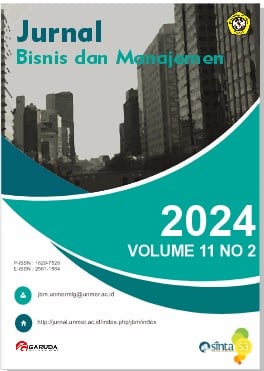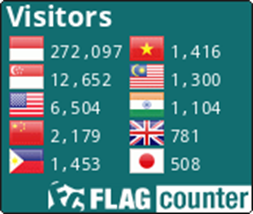Impact of Self-Efficacy, Management Skills, and Family Support on Entrepreneurial Intent Among Women Entrepreneurs in East Java, Indonesia
Keywords:
Self-efficacy, Entrepreneurial intention, Management skills, Family support, Women entrepreneursAbstract
This study examined the direct and indirect effects of self-efficacy, management skills, and family support on the entrepreneurial intent of women entrepreneurs in East Java, Indonesia. Employing a quantitative approach with a sample of 145 women entrepreneurs, structural equation modeling (SEM) with partial least squares (PLS) was utilized to analyze the data. The findings revealed that all three variables had a significant positive direct effect on entrepreneurial intent. Additionally, self-efficacy acted as a mediator in the relationship between management skills, family support, and entrepreneurial intent. These results highlight the crucial role of self-efficacy in fostering entrepreneurial intentions among women entrepreneurs and suggest that interventions aimed at enhancing self-efficacy, management skills, and family support can effectively promote women's entrepreneurshipDownloads
References
Abdallah, G. K., Masurel, E., Naudé, W. A., & Eijdenberg, E. L. (2022). Unboxing entrepreneurial motivations in Tanzania: Business-related and personal-related factors. Journal of African Business, 23(1), 60-78.
Ahmed, I., Islam, T., & Usman, A. (2021). Predicting entrepreneurial intentions through self-efficacy, family support, and regret: A moderated mediation explanation. Journal of Entrepreneurship in Emerging Economies, 13(1), 26-38.
Ahmetaj, B., Kruja, A. D., & Hysa, E. (2023). Women entrepreneurship: Challenges and perspectives of an emerging economy. Administrative Sciences, 13(4), 111.
Al-Qadasi, N., Zhang, G., Al-Awlaqi, M. A., Alshebami, A. S., & Aamer, A. (2023). Factors influencing entrepreneurial intention of university students in Yemen: The mediating role of entrepreneurial self-efficacy. Frontiers in Psychology, 14, 1111934.
Amine, L. S., & Staub, K. M. (2009). Women entrepreneurs in sub-Saharan Africa: An institutional theory analysis from a social marketing point of view. Entrepreneurship and Regional Development, 21(2), 183-211.
Atrup, A., Diawati, P., Syamsuri, S., Pramono, S. A., & Ausat, A. M. A. (2023). The Effect of Entrepreneurship Education and Creativity on Students’ Entrepreneurial Intention: The Perspective of Effectuation and Cognitive Flexibility Theory. Jurnal Kependidikan: Jurnal Hasil Penelitian dan Kajian Kepustakaan di Bidang Pendidikan, Pengajaran dan Pembelajaran, 9(2), 555-569.
Bae, T. J., Qian, S., Miao, C., & Fiet, J. O. (2014). The relationship between entrepreneurship education and entrepreneurial intentions: A meta–analytic review. Entrepreneurship theory and practice, 38(2), 217-254.
Bandura, A. (1997). Self-efficacy: The exercise of control. New York, NY: W.H. Freeman.
Bolzani, D., & Foo, M. D. (2018). The “why†of international entrepreneurship: uncovering entrepreneurs’ personal values. Small Business Economics, 51, 639-666.
Boyd, N. G., & Vozikis, G. S. (1994). The influence of self-efficacy on the development of entrepreneurial intentions and actions. Entrepreneurship theory and practice, 18(4), 63-77.
Brush, C., Edelman, L. F., Manolova, T., & Welter, F. (2019). A gendered look at entrepreneurship ecosystems. Small Business Economics, 53, 393-408.
Chauhan, S., Chauhan, K., Singh, S., Mahlawat, S., Kumar, V., & Singh, S. (2024). Analyzing family support mediating role between motivational factors and sustainable entrepreneurial intentions: A study on university students. Sustainable Technology and Entrepreneurship, 3(3), 100076.
De Bruin, A., Brush, C. G., & Welter, F. (2007). Advancing a framework for coherent research on women's entrepreneurship. Entrepreneurship theory and practice, 31(3), 323-339.
Edelman, D. A., Duggan, L. V., Lockhart, S. L., Marshall, S. D., Turner, M. C., & Brewster, D. J. (2022). Prevalence and commonality of nonâ€technical skills and human factors in airway management guidelines: a narrative review of the last 5 years. Anaesthesia, 77(10), 1129-1136.
Fatimah, S. E., & Suryana, P. (2023). MEDIATION MODEL OF SELF-EFFICACY ON STUDENT ENTREPRENEURIAL INTEREST. International Journal of Innovative Technologies in Economy, (4 (44)).
Fayolle, A., & Gailly, B. (2015). The impact of entrepreneurship education on entrepreneurial attitudes and intention: Hysteresis and persistence. Journal of small business management, 53(1), 75-93.
Hazlina Ahmad, N., Ramayah, T., Wilson, C., & Kummerow, L. (2010). Is entrepreneurial competency and business success relationship contingent upon business environment? A study of Malaysian SMEs. International Journal of Entrepreneurial Behavior & Research, 16(3), 182-203.
Ibrahim, N., & Mas’ud, A. (2016). Moderating role of entrepreneurial orientation on the relationship between entrepreneurial skills, environmental factors and entrepreneurial intention: A PLS approach. Management Science Letters, 6(3), 225-236.
Jena, R. K. (2020). Measuring the impact of business management Student's attitude towards entrepreneurship education on entrepreneurial intention: A case study. Computers in Human Behavior, 107, 106275.
Kellermanns, F. W., Eddleston, K. A., Barnett, T., & Pearson, A. (2008). An exploratory study of family member characteristics and involvement: Effects on entrepreneurial behavior in the family firm. Family Business Review, 21(1), 1-14.
Krueger, N. F. (2017). Entrepreneurial intentions are dead: Long live entrepreneurial intentions. Revisiting the entrepreneurial mind: Inside the black box: An expanded edition, 13-34.
Krueger, N. F., Reilly, M. D., & Carsrud, A. L. (2000). Competing models of entrepreneurial intentions. Journal of Business Venturing, 15(5-6), 411-432.
Liu, Y., Li, M., Li, X., & Zeng, J. (2022). Entrepreneurship education on entrepreneurial intention: The moderating role of the personality and family economic status. Frontiers in Psychology, 13, 978480.
Mei, H., Ma, Z., Zhan, Z., Ning, W., Zuo, H., Wang, J., & Huang, Y. (2022). University students’ Successive development from entrepreneurial intention to behavior: The mediating role of commitment and moderating role of family support. Frontiers in Psychology, 13, 859210.
Miao, C., Qian, S., & Ma, D. (2017). The relationship between entrepreneurial selfâ€efficacy and firm performance: a metaâ€analysis of main and moderator effects. Journal of Small Business Management, 55(1), 87-107.
Nabi, G., Walmsley, A., Liñán, F., Akhtar, I., & Neame, C. (2018). Does entrepreneurship education in the first year of higher education develop entrepreneurial intentions? The role of learning and inspiration. Studies in Higher Education, 43(3), 452-467.
Osorio, A. E., Settles, A., & Shen, T. (2017). Does family support matter? The influence of support factors on entrepreneurial attitudes and intentions of college students. Academy of Entrepreneurship Journal, 23(1), 24-43.
Pham, H. H., & Le, T. L. (2023). Entrepreneurial education and entrepreneurial intention among higher education students in Vietnam: do entrepreneurial self-efficacy and family support matter?. Higher Education, Skills and Work-Based Learning, 13(2), 403-422.
Pham, H. H., & Le, T. L. (2023). Entrepreneurial education and entrepreneurial intention among higher education students in Vietnam: do entrepreneurial self-efficacy and family support matter?. Higher Education, Skills and Work-Based Learning, 13(2), 403-422.
Rastiti, M. S., Widjaja, S. U. M., & Handayati, P. (2021). The role of self-efficacy in mediating the effect of entrepreneurship education, economic literacy and family environment on entrepreneurial intentions for vocational school students in Jember regency. Economics and Laws, 24(2), 26-42.
Rosique-Blasco, M., Madrid-Guijarro, A., & GarcÃa-Pérez-de-Lema, D. (2018). The effects of personal abilities and self-efficacy on entrepreneurial intentions. International Entrepreneurship and Management Journal, 14(4), 1025-1052.
Rosique-Blasco, M., Madrid-Guijarro, A., & GarcÃa-Pérez-de-Lema, D. (2018). The effects of personal abilities and self-efficacy on entrepreneurial intentions. International Entrepreneurship and Management Journal, 14(4), 1025-1052.
Saeed, S., Yousafzai, S., Yani-De-Soriano, M., & Muffatto, M. (2018). The role of perceived university support in the formation of students’ entrepreneurial intention. In Sustainable entrepreneurship (pp. 3-23). Routledge.
Saraih, U. N., Aris, A. Z. Z., Mutalib, S. A., Ahmad, T. S. T., Abdullah, S., & Amlus, M. H. (2018). The influence of self-efficacy on entrepreneurial intention among engineering students. In MATEC Web of Conferences (Vol. 150, p. 05051). EDP Sciences.
Shinnar, R. S., Hsu, D. K., & Powell, B. C. (2018). Entrepreneurial intentions and start-ups: Are women or men more likely to enact their intentions? International Small Business Journal, 36(1), 60-80.
Shirokova, G., Osiyevskyy, O., Bogatyreva, K., Edelman, L. F., & Manolova, T. S. (2022). Moving from intentions to actions in youth entrepreneurship: An institutional perspective. Entrepreneurship Research Journal, 12(1), 25-69.
St-Jean, É., & Mathieu, C. (2015). Developing attitudes toward an entrepreneurial career through mentoring: The mediating role of entrepreneurial self-efficacy. Journal of Career Development, 42(4), 325-338.
Taneja, M., Kiran, R., & Bose, S. C. (2024). Assessing entrepreneurial intentions through experiential learning, entrepreneurial self-efficacy, and entrepreneurial attitude. Studies in Higher Education, 49(1), 98-118..
Van Ewijk, A. R., Nabi, G., & Weber, W. (2021). The provenance and effects of entrepreneurial inspiration. International Journal of Entrepreneurial Behavior & Research, 27(7), 1871-1890.
Wach, D., Stephan, U., Gorgievski, M. J., & Wegge, J. (2020). Entrepreneurs’ achieved success: developing a multi-faceted measure. International Entrepreneurship and Management Journal, 16, 1123-1151.
Welter, F., Brush, C., & De Bruin, A. (2014). The gendering of entrepreneurship context. Institut für Mittelstandsforschung Bonn (Hrsg.): Working Paper, 1, 14.
Xu, F., Kellermanns, F. W., Jin, L., & Xi, J. (2020). Family support as social exchange in entrepreneurship: Its moderating impact on entrepreneurial stressors-well-being relationships. Journal of Business Research, 120, 59-73.
Zhao, H., Seibert, S. E., & Lumpkin, G. T. (2010). The relationship of personality to entrepreneurial intentions and performance: A meta-analytic review. Journal of management, 36(2), 381-404.
Downloads
Published
How to Cite
Issue
Section
License
Authors who publish with this journal agree to the following terms:
(1) Copyright of the published articles will be transferred to the journal as the publisher of the manuscripts. Therefore, the author confirms that the copyright has been managed by the journal.
(2) Publisher of Jurnal Bisnis dan Manajemen is University of Merdeka Malang.
(3) The copyright follows Creative Commons Attribution–ShareAlike License (CC BY SA): This license allows to Share — copy and redistribute the material in any medium or format, Adapt — remix, transform, and build upon the material, for any purpose, even commercially.














